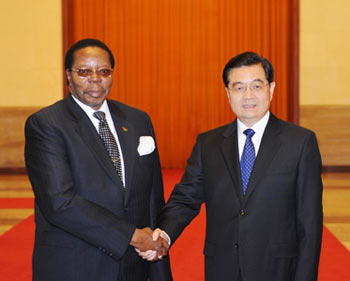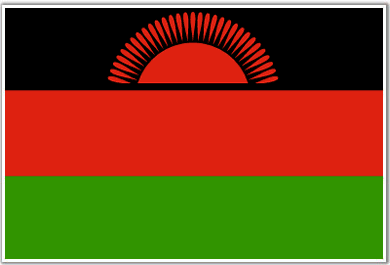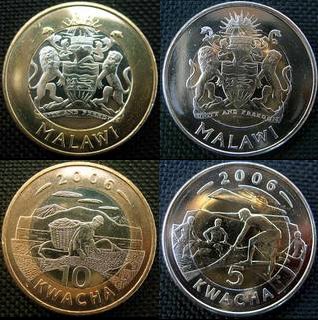
Bongani leading a group called Jozi stepped in with fellow popular
South African Kwaito star in the name Ishmael of Avulekile fame and
ruptured into fire the moment they touched the naked microphone to dish
out the best of the rest.
Brenda once appeared in Malawi in the
90's and her son's first appearance in Blantyre was an inspiration to
all orphans as well as a great honour to the Mutharika family.
It
spoke volumes of his intimate feelings about death and orphanage when
he consistently pointed on the words inscribed on his T-shirt in
reference to her late mother's identities.
Like mother like son,
Bongani expressed himself better in his dancing antics when he wriggled
his body as if he had forgotten his bones back in South Africa.
He was not a disappointment when he exited the stage with his mother's popular Vulindlela song while promising to come back.
Vulindlela managed to rip through the patronage with wildest sing along as if it was Brenda herself doing it.
In
his speech at the intermittence of the songs Bongani urged people
especially the youths to be united against pangs of orphanage which
have muzzled the Africa region and turned it into a place of crisis.
"We
thank organizers of the show for making it possible for us to interact
in this big way, and our message is that of unity, we are representing
the whole of Johannesburg, South Africa," he said.
"We are 100
percent dancers, we express ourselves through the music we play and our
dreams are to see the reduction in the problems which come due to
orphanage in African community," said Bongani.
Such was an event where 12 Television cameras flew around pointing at one spot, attracting Dstv's Channel O crew.
Then came Kenyan Nameless who stole Malawi thunder, thudding like a bombclat.
Fun famished youths kept kicking one another's feet, taxing and dancing with ecstatically sharp degree of immerse.
Seeing
five key international artists taking turn competing for supremacy on
an extraordinary day in a mammoth centre town like Limbe, did show a
real definition of happiness.
Saturdays are market days in
Limbe, people from all the corners of Blantyre flood into the centre
town, to spend their day roaming around or shopping while braving the
threats of weather from Mpingwe mountains.
But this Saturday the
situation was different, the crowds kept trooping into Country Club
Limbe (CCL) to commemorate Ethel Mutharika's charismatic life through
music festival.
The above facts combined together do
automatically explain the huge size of patronage at golf club ground
and the electric mood that ruptured into life the moment the powerful
remote driven equipment was set into roll.
It justifies why the
father of the nation State President Bingu wa Mutharika could not
resist driving in and spent brief moment where he was accorded wildest
standing ovation by the jovial youths.
Ten years from now it
would not be surprising to see the occasion evolving into an official
Africa fiesta, the class of Nelson Mandela's HIV Aids 464-46 Concert in
South Africa.
An assurance from Channel's Kabelo that the show
would be shown on Africa's month of celebration programme injected new
value altogether.
As a matter of fact in Mozambique there is
also a similar memorial fiesta the only difference is that there,
people go on public holiday on April 7every year commemorating death of
one First lady who died while in office in 1980's.
The venue
Country Club Limbe (CCL) has special features, it has the widest open
ground, as it has soccer pitch, Hockey as well as golf course almost at
one place.
By noon on the day, there was no space left, the
crowd had muzzled it up, demonstrating the fierce nature of patronage.
It was unbelievable if there were other activities happening with in
the city.
Channel O's pretty man Kabelo who presided over the event as Master of Ceremonies could not get tired signing autographs.
He
opened his business with country men Jozi when they came in sorts of
funny dancing, sometimes almost bending like a fringe making watching
easy.
Lilongwe based Hard Beats a group comprising, two girls
and two boys was a surprise package of the day when they performed
their pop romantic songs while demonstration the ideal definition of
new age live love life long.
Other local young artists worthy
mentioning were Lilongwe based Area 43 Kwame who introduced hip hop
tunes Till 6 and the popular radio single Dance Yavuta, Third Eye from
Blantyre Dominic one and the Merriment of Nkolokosa who did Kiss Kiss
by Chris Brown also made watching meaningful.
It had to be Nameless'
turn to convert the festival into his own when he revealed his chart
busting Iminawewe song where patrons sung along chorus going like
Aiya-iya-yii, Ai ya-wo-oo, mimicking swahili lines.
Probably
one of the best dressed artists, trailing Taygrin's customary suit,
Nameless donned top beautiful purple jacket, fashionable jean, shiny
belt, a lace and black T-shirt.
He came into thunder when he
traveled in his perfect relics, If you like to dance, here is a chance,
It is in the air, it is every where, Nameless, so manner less Oh yes I
like to get into this mess, Karibia, usiya gope (Come close to me,
don't fear).
Drama came when girls started scrambling for him when he jumped down to pick one of his choice from the crowd to dance with.
He was seen throwing his top jacket, sweating profusely when fans challenged him for more.
Dan Lufani's Zimathera mwa khaze was a marvel to think about when his sexy dancers took stage flying their kisses.
The
journey started at Chileka Airport where all the artists including the
most respected Kmillian and Nigerian's 2 Face Idibia made speeches
about their participation on the memorial event and how they inclined
to the plights of under privileged communities as well as orphaned
children.
Executive Director of Ethel Mutharika Foundation
Tapiwa during the night said the event which started last year in
Lilongwe would be back next year.
She reiterated that the late
First Lady Mutharika did not want people to mourn her for ever but to
celebrate her life and further her programmes of cheering under
privileged communities.
"Ethel Mutharika Memorial music festival
would be back next year, we decided to invite international artists of
repute to join hands in working for under privileged communities, the
way my mother wanted it, to be," she said.
Speaking during the
show trustee Duwa Mutharika, said proceeds of the show would be
channelled to the work of constructing an orphanage centre at a
location to be identified in the country
 As
As


 President Bingu wa Mutharika has asked 40 world
President Bingu wa Mutharika has asked 40 world
 The government of the People's Republic of China is to finance the
The government of the People's Republic of China is to finance the Madonna arrived at Cannes film festival yesterday with a documentary about the effects of disease and poverty in Malawi.
Madonna arrived at Cannes film festival yesterday with a documentary about the effects of disease and poverty in Malawi. Economic and civil society commentators have
Economic and civil society commentators have LILONGWE (Reuters) - Malawi said on Friday it had started to
LILONGWE (Reuters) - Malawi said on Friday it had started to LILONGWE
LILONGWE Peoples Trading Centre Limited (PTC), owners
Peoples Trading Centre Limited (PTC), owners
 President Bingu wa Mutharika Monday said that he
President Bingu wa Mutharika Monday said that he This is however the first time
This is however the first time


 There is no shortage of reasons for remembering
There is no shortage of reasons for remembering Bongani leading a group called Jozi stepped in with fellow popular
Bongani leading a group called Jozi stepped in with fellow popular












